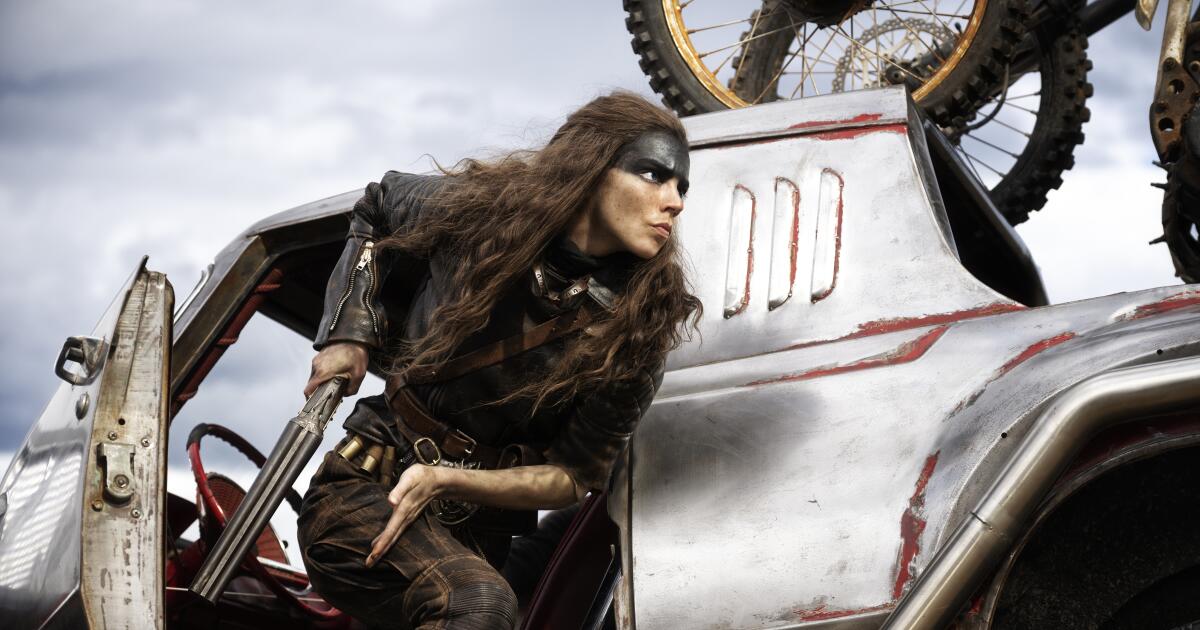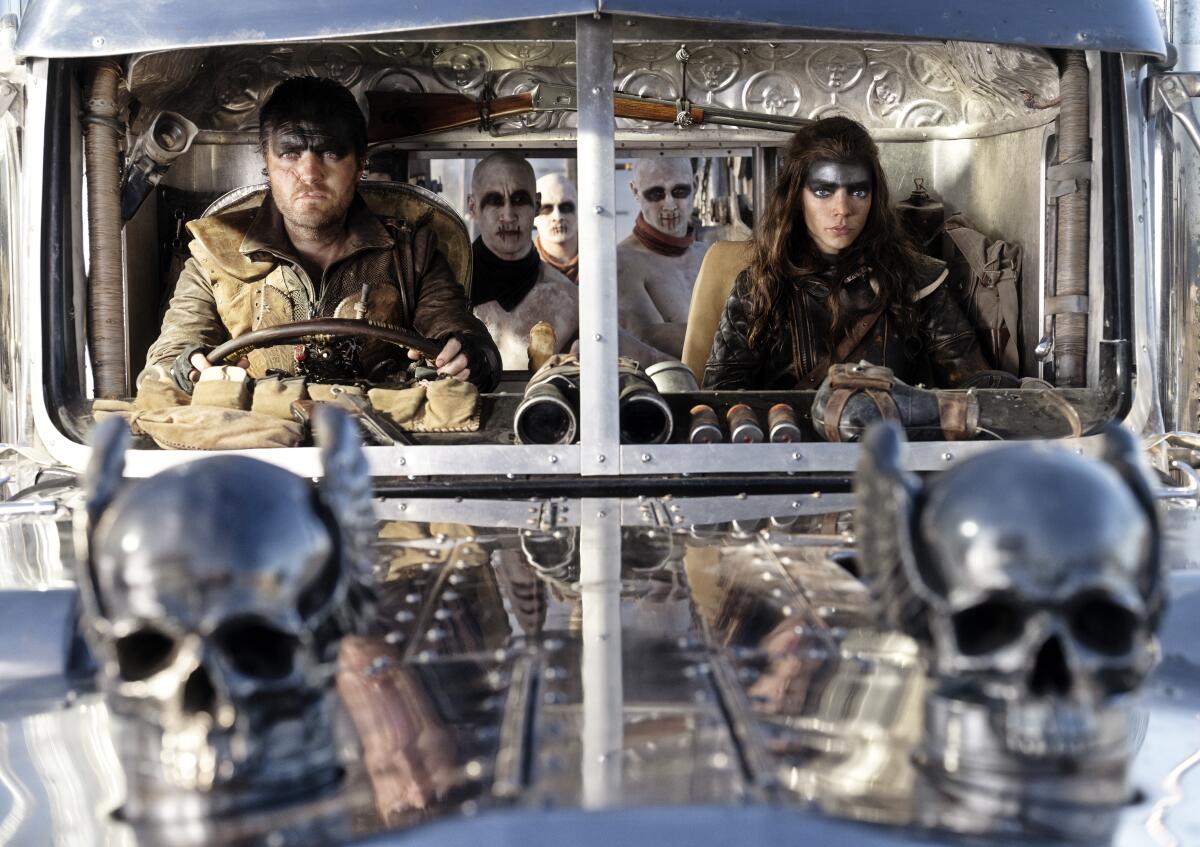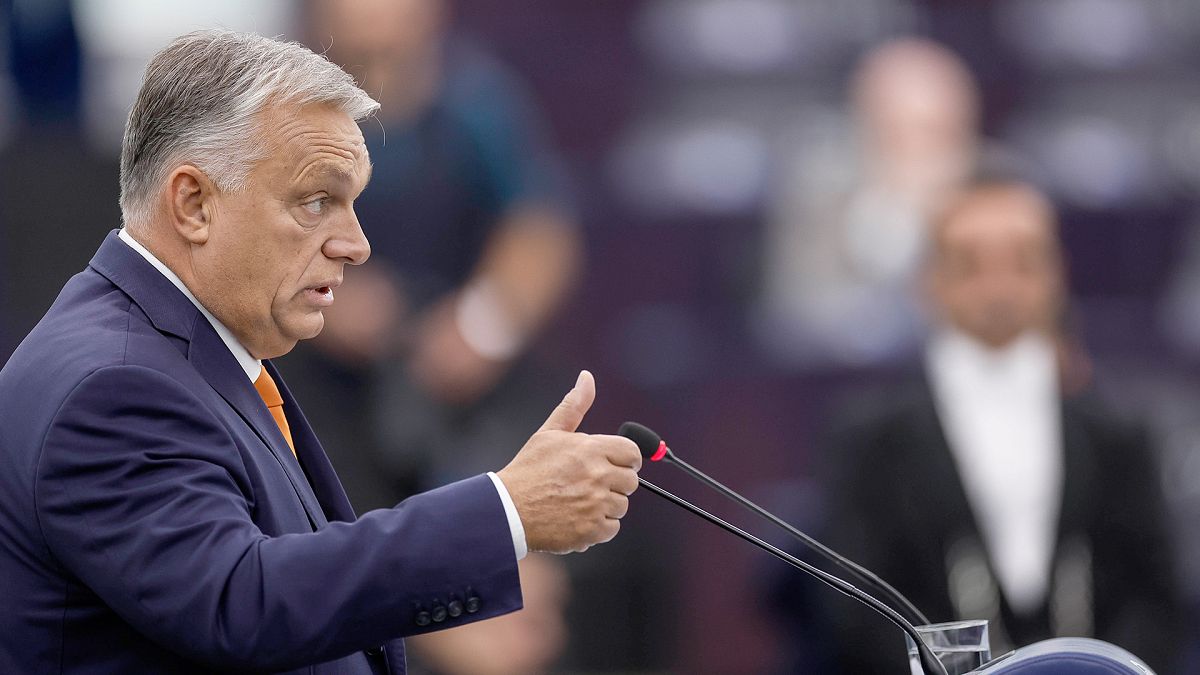Entertainment
Cannes: 'Fury Road' prequel ‘Furiosa’ forgets what makes the 'Mad Max' movies great

When Australia’s George Miller came here in 2016 to serve as jury president, just months after his “Mad Max: Fury Road” won six Oscars, he swept in like a conquering hero. His movie was undeniable: a reinvigoration of both his career and the action genre. Often, the relationship between Cannes and the blockbuster directors it invites comes off as strained — see French artist Zaho de Sagazan serenading “Barbie” filmmaker and this year’s jury president Greta Gerwig at Tuesday’s opening ceremony — but with Miller, the moment felt right.
Things change. His “Furiosa: A Mad Max Saga” (in theaters May 24), a somewhat dutiful new prequel to “Fury Road,” had its world premiere out of competition Wednesday, unspooling at the capacious Grand Lumière Theatre to a rapt audience that, it must be said, didn’t laugh once. “Who laughs at the end of the world?” you may ask. But that would be to deny Miller the richness of his grungy post-apocalyptic series, one that pairs brutal action sequences with emotional resonance, dark mythmaking, sociopolitical alarm and, yes, the odd Ozploitative chuckle at some catastrophic personal misfortune.
Some of that is in evidence in “Furiosa,” but nowhere near enough. For the first time in Miller’s now-five-film franchise, he seems to be falling shy of the immediacy he’s sustained, often deliriously, for an entire feature. Any prequel would necessitate a certain distance: This is what happened before the story you already know. And if you ever confused Charlize Theron’s hollowed-out stare in “Fury Road” for a lack of backstory (that’s actually the performance you’re noticing), “Furiosa” is here to supply that material for you, not unentertainingly. But with every supersaturated blue sky, russet-colored desert shot and faux-literary chapter heading (“2. Lessons from the Wasteland”), the movie gets further away from feeling like a tale that’s happening, to one that’s already been told, cleaned up and prettified.
Miller still mounts a story more confidently than just about anyone on the planet, and his kickoff, a 10-minute, near-wordless chase, is the definition of getting off on the good foot. A ferociously protective mom (the wonderful Charlee Fraser) trails, on horseback and motorcycle, a gang of kidnappers who have fled with her preteen daughter Furiosa (Alyla Browne, expressive during the film’s first hour). The latter, while unfortunate to be caught, is resourceful in her own way, chewing through fuel lines and blessed with the benefit of an especially prescient name. Flung over the back of a bike, her long hair flowing in the wind, the shot brings to mind to another defiant woman in Miller’s 1982 “The Road Warrior.”
A scene from the movie “Furiosa: A Mad Max Saga.”
(Jasin Boland / Warner Bros. Pictures)
A word about that stone-cold classic: By dint of the technology that was then on hand (i.e., no digital effects and a nutso stunt crew), “The Road Warrior” throws you into bodily panic with every kinetic setup. “Furiosa” rarely feels dangerous. Too much of its blood and fire is the work of computers, and for the first time, that work is obvious. There’s something very un-“Mad Max” about this; the tactility of the earlier films fed into the realness of potentially surviving the fall of civilization, even if that meant coming face to face with a tyrannical Tina Turner.
But the punkish spirit of the young Furiosa — forced to sit in a cage like a sad pet — goes a long way to setting up our connection with the story. Less so her captor, Dementus, played by Chris Hemsworth, who, though he tries hard to build an arm-swinging, cape-wearing, motormouthed swagger, doesn’t have the lines to give his gang leader the kind of vanity we could relish in a villain. Eventually we get those bleach-pale War Boys from “Fury Road” again, along with the monstrously masked Immortan Joe (Lachy Hulme), his thuggish mutant son Rictus (Nathan Jones) and a geographical trade war that’s a bit more complex than it needs to be.
Miller, who with co-screenwriter Nick Lauthoris worked out these script details before they approached “Fury Road,” mainly have their sights set on a centerpiece that comes close to redeeming the entire film: a lavishly armed War Rig truck barreling down an endless highway, hounded by attackers with propellers strapped to their backs. Finally, the grandeur of the older movies is here, as is Anya Taylor-Joy, whose Furiosa has now gone through her Yentl-passing-for-a-boy phase and now seems meant to wear a glamorous black smudge on her forehead and learn everything she needs to know about “road war” from Praetorian Jack (Tom Burke of “The Souvenir,” channeling the Leone-esque minimalism that marked Mel Gibson’s original antihero).

Tom Burke and Anya Taylor-Joy in the movie “Furiosa: A Mad Max Saga.”
(Jasin Boland / Warner Bros. Pictures)
We have a lot to learn about road war as well. What’s a bommy-knocker? (I won’t spoil it, but generally, you pay extra for that option.) There’s a finding-your-calling film built into “Furiosa” — maybe it took the apocalypse for this former fruit-picker to discover what she does well — plus a hint of a front-seat romance that’s never made explicit. But just as the movie is hitting its stride and Simon Duggan’s cinematography settles down, Miller strays back to a less-exciting vengeance narrative.
Much has already been made of Taylor-Joy’s lack of dialogue — hardly a drawback when you take in her burning stares and see how potently she’s making something out of nothing. If the movie has a deficiency (and it does), it’s not one of exposition but euphoria. The “Mad Max” universe was never that cautionary, not if you yourself ever wondered how you’d make it through societal meltdown and what kind of mohawk you’d get. The exhilaration of the polecats sequence in “Fury Road” — that fact that there’s such a thing as polecats — made the series a constant source of glee.
“Furiosa,” to its distinction and detriment, ends up being too self-regarding, too downbeat. It takes the fun out of survival. Miller’s imagination has fed into “The Last of Us,” “Fallout” and a host of other grayscale nightmares for movies and TV. He knows better than anyone that forward momentum is key to a “Mad Max” movie. Leave the prequels to those who don’t have any gas left in the tank.

Entertainment
Review: 'Here' takes the elements of a 'Gump' reunion and flattens them into faux-cosmic tedium

Lately, filmmaker Robert Zemeckis has been a somewhat confounding figure. The director of such beloved movies as the “Back to the Future” series, “Forrest Gump,” “Cast Away,” “Death Becomes Her” and “Who Framed Roger Rabbit” has delivered almost as many duds as hits, if you also take in “The Polar Express,” “Beowulf,” “Welcome to Marwen” and “Pinocchio.” An experimenter obsessed with special effects and the dramatic power they can exert in cinema, Zemeckis is always trying something new, especially with motion-capture technology. It doesn’t always work: Many of these projects drift into an unappealing uncanny valley. Despite his several attempts, he hasn’t quite nailed it yet.
In his new intergenerational family drama “Here,” based on a 2014 graphic novel by Richard McGuire (expanded from a six-page comic strip published in the comics anthology “Raw” in 1989), the experiment is the narrative itself, a family history spanning generations — and centuries — all told from one fixed point of view. In his formally inventive graphic novel, McGuire used frames within frames to visually represent different time periods within one panel.
Zemeckis maintains the frames-within-frames conceit as a transitional flourish in the film version of “Here,” but the plot itself is more about jumping around in time while maintaining the stationary camera. There are many inhabitants of this space, from a Native American couple (Joel Oulette and Dannie McCallum) in pre-Columbian times, to a young family in the Victorian era (Michelle Dockery and Gwilym Lee) who move into their modest Colonial home, and then later, the inventor of the La-Z-Boy recliner (David Fynn) and his ebullient wife (Ophelia Lovibond), who take the home. There’s also a present-day Black family (Nicholas Pinnock, Nikki Amuka-Bird and Cache Vanderpuye) navigating the COVID-19 pandemic and the Black Lives Matter movement.
But the story focuses predominantly on a family that occupies the house for most of the 20th century: a World War II veteran, Al (Paul Bettany), his wife, Rose (Kelly Reilly) and then their son Richard (Tom Hanks) and his wife, Margaret (Robin Wright). And yes, Hanks and Wright have been digitally de-aged — we see them for the first time as teens — and no, it does not work at all (there’s something very strange happening around Hanks’ de-aged mouth). Sure, the Hanks, Wright and Zemeckis trio supplies the gimmick of a “Forrest Gump” reunion, but why do we have to de-age Hanks when there are his real-life sons Colin and Truman at home? Even Wright has a look-alike actor daughter, Dylan Penn.
“Here” also has that Gumpian quality of major historical events lining up with personal stories: Benjamin Franklin (Keith Bartlett) and his son William (Daniel Betts) occupy the Colonial manor across the street; a pregnancy is announced as the Beatles take the stage on “The Ed Sullivan Show”; and seemingly everything relevant happens in this godforsaken living room, including weddings, births and breakups.
The story of “Here” surrounding Richard and Margaret is relatable, entirely predictable and utterly dull. They get pregnant as teens, move in with his family, he gives up art to get a real job, she wants her own space, etc.. Ostensibly, their story is about navigating the ups and downs of life, but ultimately it turns into a rather dispiriting tale about two people taking too long to pursue the things that make them happy, and for her, it’s getting out of that damn house, though if she ever left, there would be no “Here” here.
Changing hands over the years means real estate agents coming in and out throughout the film, and by the time the credits roll, you half expect the logo for a home insurance company to come up, because that’s what this whisper of a film feels like: a commercial for homeowners insurance. To be frank, there are 30-second spots that have inspired more tears and emotion than the flat, pointless “Here.”
Richard and Margaret’s daughter Vanessa (Zsa Zsa Zemeckis) disappears around age 16 and never reappears again, which is a shame, because the more interesting story isn’t the parents’ baby boomer tale, but perhaps how their Gen-X daughter or zoomer grandchildren might benefit from their generational wealth. “Here” doesn’t want to dig into any of the nuances surrounding that. But perhaps property values are just where the mind wanders when the story playing out is so treacly and stale.
This year has seen other daring projects from aging filmmakers who have experimented with cinematic form and function on their own terms — including Francis Ford Coppola’s “Megalopolis,” and Kevin Costner’s “Horizon.” While the efforts have been laudable, unfortunately, the results have all been flops and “Here” is no exception.
Katie Walsh is a Tribune News Service film critic.
‘Here’
Rated: PG-13, for thematic material, some suggestive material, brief strong language and smoking
Running time: 1 hour, 44 minutes
Playing: In wide release Friday, Nov. 1
Movie Reviews
Movie Review: Church and Politics mix and mingle among the “Godless”

“Godless” is a self-serious drama about the collision of politics and faith with a couple of decent moments and solid lead performances by Ana Ortiz and Harry Lennix going for it.
Working against it are a static staginess in the action — lots of talk and debate, little of it setting off any sparks — a truncated dramatic arc, messiness in the order of events as they’re presented (basically its a long flashback) with an abrupt “atonement” and reconciliation attempt for its finale.
But again, there’s serious subject matter to wrestle with.
Writer (“The Brooklyn Banker”) turned first-time writer-director Michael Ricigliano drops into a world of heavy-handed Catholic politicking as an upstart bishop (Lennix, a big and small screen veteran and regular on “The Black List”) excommunicating a gay marriage-endorsing, abortion-protecting New York governor (Ortiz, of TV’s “Ugly Betty” and “Love, Victor”).
The bishop is new to Brooklyn, and while he sent a letter “warning” to the governor, his Latin, sealed-in-wax edict can’t be read by any non-Catholic living in America in 2024 as anything but religious minority election interference.
Thus our first impression of Bishop Rolland, clumsily avoiding press questions about if “the Vatican is on board with this” as he condemns a Latina Catholic governor who “ceased to live as a Catholic” when she signed off on legislation, is that he’s a fanatic somewhat out of his depth as a political showboater.
Then we get a load of the turmoil in the archioceses, with a bishop (Thomas G. Waites) and archbishop (Dan Grimaldi) weighing whether they have the leverage to make this pay off.
Because popular Gov. Porra seems destined for the White House. And they simple can’t have a pro choice Catholic living on Washington’s Pennsylvania Ave.
Gov. Porra is facing a primary challenge, with her top aide (Patrick Breen) all-in on her drawing a broad coalition and doing “the right thing.” He’s gay, and bringing him along for “negotiations” with the unelected church power elite gives him the film’s only funny line.
“I’m Jewish!”
“So was Jesus,” the governor notes.
“Look what happened to him.”
There’s a squishiness to the point of view Ricigliano tries to impart here, a governor who says “I will not legislate my beliefs,” who says “contritition” is “not an option,” but who is conflicted about a bill the screenplay repeatedly refers to using right wing labeling — “late term abortion.”
The denial of Holy Communion to the governor by her parish priest is the jolt such political stunts are meant to deliver.
But a lot of counter-strategies are suggested by both sides, meeting in private, which are merely mentioned and not followed up on. An awful lot of the talk and scene-changing here seems pointless.
And then we get to the long third act meeting of reconciliation between the two, years later, introducing their “real” beliefs and guilty reasoning.
The leads in “Godless” dig into the “idea” for an interesting film. But this feels like the compromised, lost-its-nerve and too-short-to-score-points version.
Rating: R, profanity
Cast: Ana Ortiz, Harry Lennix, with Patrick Breen, Sarah Wharton, Dan Grimaldi and Thomas G. Waites.
Credits: Scripted and directed by Michael Ricigliano. A Without a Net release.
Running time: 1:26
Entertainment
'La Cocina' raises the heat on kitchen power dynamics. It's where Rooney Mara wants to be

I spent 7 years working as a cashier (and as a cook when needed) at a fast-food establishment in Southeast Los Angeles before DACA allowed for other options. It was with a crew of mostly other undocumented people like myself that I shared frustrations and small triumphs alike one late night after another for minimum wage. Beholden to the ticket machine incessantly spitting out orders, we moved at superhuman speed.
The same mechanical monster taunts the staff at the Grill, the fictional Times Square restaurant at the center of Mexican writer-director Alonso Ruizpalacios’ “La Cocina,” a black-and-white reimagining of British author Arnold Wesker’s 1957 play “The Kitchen.”
Almost 70 years after its initial performances, the drama’s warning about prioritizing productivity above humanity remains dishearteningly relevant in our current vicious reality. In theaters Friday, “La Cocina” captures the superficial camaraderie forged in high-pressure jobs where people rely on each other to make it through the day, as well as the dynamics of power in an economic system that thrives on exploiting the most vulnerable — the unseen.
Set in an atemporal New York City (phone booths and old computers coexist alongside more modern references), Ruizpalacios’ adaptation turns the protagonist, Peter, a German in the post-WWII era, into Pedro (Raúl Briones), a rage-fueled Mexican immigrant from Puebla. His brash personality has earned him the respect and scorn of his co-workers in equal measures.
When money from the register goes missing, Pedro becomes a prime suspect. The amount curiously matches the exact cost of the abortion he reluctantly agrees to pay for when his waitress girlfriend Julia (Rooney Mara) reveals she is pregnant.
Rooney Mara and Raúl Briones in the movie “La Cocina.”
(Willa)
An investigation gets underway amid the daily catastrophes typical of any intense food-service environment (loss of tempers, crying in frustration). Here the strong abuse the weak. It’s a microcosm of the world and its vices, and not only because the sounds of several languages permeate the steamy premises.
Ruizpalacios first read “The Kitchen” while studying acting in London in the 2000s. At the time, he worked at the kitschy Rainforest Café in Piccadilly Circus — a now-defunct theme restaurant with animatronic animals — to help pay for his tuition. His fascination with kitchens and their rhythms came from that firsthand experience.
From those days, Ruizpalacios remembers a French Algerian co-worker named Samira, the only woman in the kitchen and a tough salt-of-the-earth motherly figure. A character directly inspired by Samira (and named after her) appears in “La Cocina.”
“She was very demanding and took no s—, but when s— hit the fan, she would be the only person to lend you a helping hand,” Ruizpalacios, 47, recalls on Zoom from his home in Mexico City. “She would always say, ‘Come on, Mexican, come on. Where are you?’”
With no connection to Rooney Mara but a conviction that she would be ideal for the role of Julia, a bold Ruizpalacios wrote her a letter detailing why she should take a risk and go down to Mexico City to make an indie movie with a group of mostly unknown actors.
“Pedro sees Julia as a sort of movie star,” says Ruizpalacios. “I knew casting someone like Rooney, who is well-known and has that movie-star aura, would add to the relationship.” It was the juxtaposition of Mara’s potent, sinewy turn in “The Girl with Dragon Tattoo” and the nuanced fragility she exuded in “Carol” that confirmed his admiration for her performances.
To his surprise, Mara responded positively to his “message in a bottle at sea.”

“I haven’t really done real theater as an adult, but it felt very close to that because we were doing these long, full takes and there was so much energy,” says Mara of Ruizpalacios’ working methods.
(Marcus Ubungen / Los Angeles Times)
“I’ve read quite a few of them and it’s always really nice to get a letter like that, but I wouldn’t say that they’re always necessarily very effective,” Mara, 39, tells me on a video call from her home in Los Angeles, dressed in a plain gray T-shirt with her hair tied up in a half-ponytail. “But there was something poetic about his letter that really touched me and made me very curious about him and about his script.”
Mara requested Ruizpalacios’ previous films (he sent her his two acclaimed Mexico City-set breakthroughs, 2014’s coming-of-age dramedy “Güeros” and 2018’s heist movie “Museo”), and soon after she agreed to star in “La Cocina.”
“My time is very precious now that I have kids,” Mara says. “To me now, the experience is so important. I’m like: Is this going to be a worthwhile experience? Is it something I can grow from? And everything about the way Alonso wanted to make the film to me was like, ‘Yes, this is an experience I’d like to have.’ It seemed different than anything I had done thus far.”
Back in 2010, Ruizpalacios directed a stage version of “The Kitchen.” Briones, then a student of Ruizpalacios’ acting courses, had a much smaller role as the immigrant restaurant owner demanding his missing funds, and later as a vagabond who wanders into the kitchen. “Pedro exists between these two archetypes: the immigrant who made it and the pariah,” the actor says on the phone from Mexico City. “He’s fighting to be the master of his own life.”
But despite having worked with Briones over the years, including in his previous film, 2021’s docufiction “A Cop Movie,” the director didn’t immediately cast the actor as Pedro. His hesitation came from knowing Briones didn’t speak English, a requirement for the part.
“One of his greatest qualities as an actor is his discipline,” Ruizpalacios says of Briones.

“Kitchens are very much like a pirate ship and the way we designed and conceived our kitchen was also like a submarine,” says Ruizpalacios.
(Marcus Ubungen / Los Angeles Times)
The actor learned the foreign tongue well enough to hold his own in multiple scenes with Mara in just three months. “I would challenge anyone to dominate another language in that time and feel comfortable enough to act in it,” Ruizpalacios says about his lead’s commitment.
For Briones, learning English — even in the movie’s limited capacity — had an empowering effect. In Mexico, those who grow up attending public schools, as was his case, don’t have access to a bilingual education. For a long time, Briones refused to speak or learn the language as a self-defense mechanism against the mockery he’d experience from others.
“Pedro has been a great teacher for me,” Briones says of his bilingual character who can advocate for himself. “Pedro’s obsession with speaking English has a survival reason, and my decision to not speak it did as well.” When presented with the opportunity to play the lead, Briones took a more technical approach to learning English with the help of fellow “La Cocina” actor María Fernanda Bosque, who served as his impromptu coach.
Exteriors for “La Cocina” were shot on location in New York City (around Times Square including Junior’s Restaurant & Bakery as the front of the Grill), but for the kitchen itself, Ruizpalacios wanted to play in his home turf. The director had long dreamed of working at Mexico City’s famed Estudios Churubusco, the soundstages where many classics from the national cinema’s Golden Age were made. This also allowed for more control over the design of the kitchen.
“Kitchens are very much like a pirate ship and the way we designed and conceived our kitchen was also like a submarine,” Ruizpalacios says. And since kitchens tend to be male-dominated spaces, the director hired a traditional all-male Welsh choir to sing the lyrics to the Mexican song “Un Puño de Tierra” (A Fistful of Dirt) translated into Welsh on top of music by composer Tomás Barreiro. The existentialist lyrics speak about the futility of material pursuits.
The track comes on during Pedro’s most emotionally charged moments: when he looks at the pictures of his family (they’re photos from Briones’ actual childhood) and when he calls his mother back home (the person who answers is Briones’ own mother).
“That song became the beating heart of the film,” says Ruizpalacios.
For the rehearsal process Ruizpalacios brought together his cast, with the exception of Mara, in Mexico City for a month. In the mornings they all took cooking classes and in the afternoons they participated in improvisation exercises to build a natural rapport. Though she regrets missing it, Mara believes that ultimately being absent from the in-person preparation aligned with her character’s position as an outsider.

“There are times where I’ve made decisions and done things that I probably shouldn’t have,” says Mara. “[There’s] a time in your life where you just want to work because you don’t want to be in your life. And then in the last six years I’ve barely worked at all.”
(Marcus Ubungen / Los Angeles Times)
“When you become a parent, there’s a carefree part of your life that no longer exists,” says Mara. “My character is a mom, and that’s the thing that separates her from her co-workers.”
Over time, prioritizing her children has made Mara herself increasingly selective. “There are times where I’ve made decisions and done things that I probably shouldn’t have,” Mara says. “[There’s] a time in your life where you just want to work because you don’t want to be in your life. And then in the last six years I’ve barely worked at all. I’ve done, like, two things.” (Those two things were Guillermo del Toro’s “Nightmare Alley” and Sarah Polley’s “Women Talking.” Mara knows how to pick them.)
“La Cocina” consistently proved to be an invigorating escape for her. One of the most technical astounding sequences takes place during a lunch rush. The kitchen turns into a madhouse with cooks working and waitresses fighting to get their orders out first, all while the floor is flooded with soda.
“We shot it over several days, and it was very much like a choreographed dance,” recalls Mara. “I haven’t really done real theater as an adult, but it felt very close to that because we were doing these long, full takes and there was so much energy.”
The sequence emerged from one of Ruizpalacios’ personal memories. On Christmas Eve in New York City 13 years ago, the director and his wife, actor Ilse Salas, visited a Times Square multiplex. When buying concessions, he realized the carpet was drenched. The liquid was coming from a broken Cherry Coke machine “spilling like an endless spring,” he recalls, as if coming from “the center of the Earth.”
“Nobody paid any attention to it,” he recalls. “It just kept pouring and flooding the whole place. And the people just kept working, ignoring it. I thought that was the perfect image of late-capitalism.” The couple watched “The Girl with the Dragon Tattoo” starring Mara. “I said to my wife, ‘One day I’m going to work with her,’ so this movie closed that circle.”
With the help of the Mexican Coalition, an organization that supports immigrant families, Ruizpalacios interviewed several undocumented kitchen workers in New York City about their daily experiences. Those interactions were essential to his research and writing process.“Listening to them you realize that no one has ever asked them about their story,” says Ruizpalacios.
“Mexicans are considered great workers around the world and that’s very positive, but it is also due to the fact that we are obedient and being obedient is very convenient to the system,” Briones says. “Pedro is not obedient. Disobedience is revolutionary.”
For the U.S. release of “La Cocina,” the distributor Willa partnered with One Fair Wage, a restaurant workers’ advocacy group, to present a series of screenings and events. Recently, a video presentation featuring clips from the film with documentary footage of NYC restaurant workers was shown on the enormous curved NASDAQ billboard in Times Square. Ruizpalacios always had this kind of visibility in mind for the men and women who sacrifice their physical and mental well-being to provide a service that most take for granted.
“In ‘La Cocina’ we don’t care about the customers,” he says. “This time they are the extras. That is the point of the film.”
-

 Movie Reviews1 week ago
Movie Reviews1 week agoAlien Country (2024) – Movie Review
-
/cdn.vox-cdn.com/uploads/chorus_asset/file/25431700/STK201_SAM_ALTMAN_CVIRGINIA_A.jpg)
/cdn.vox-cdn.com/uploads/chorus_asset/file/25431700/STK201_SAM_ALTMAN_CVIRGINIA_A.jpg) Technology7 days ago
Technology7 days agoOpenAI plans to release its next big AI model by December
-

 Health6 days ago
Health6 days agoNew cervical cancer treatment approach could reduce risk of death by 40%, trial results show
-

 Culture7 days ago
Culture7 days agoTop 45 MLB free agents for 2024-25 with contract predictions, team fits: Will Soto get $600M+?
-

 Sports5 days ago
Sports5 days agoFreddie Freeman's walk-off grand slam gives Dodgers Game 1 World Series win vs. Yankees
-
News5 days ago
Sikh separatist, targeted once for assassination, says India still trying to kill him
-

 Culture5 days ago
Culture5 days agoFreddie Freeman wallops his way into World Series history with walk-off slam that’ll float forever
-

 Technology4 days ago
Technology4 days agoWhen a Facebook friend request turns into a hacker’s trap

/cdn.vox-cdn.com/uploads/chorus_asset/file/25697380/STK071_APPLE_A.jpg)













